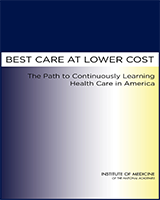NCBI Bookshelf. A service of the National Library of Medicine, National Institutes of Health.
Committee on the Learning Health Care System in America; Institute of Medicine; Smith M, Saunders R, Stuckhardt L, et al., editors. Best Care at Lower Cost: The Path to Continuously Learning Health Care in America. Washington (DC): National Academies Press (US); 2013 May 10.

Best Care at Lower Cost: The Path to Continuously Learning Health Care in America.
Show detailsBest Care at Lower Cost: The Path to Continuously Learning Health Care in America presents a vision of what is possible if the nation applies the resources and tools at hand by marshaling science, information technology, incentives, and care culture to transform the effectiveness and efficiency of care—to produce high-quality health care that continuously learns to be better.
More than a decade since the Institute of Medicine's (IOM's) To Err Is Human: Building a Safer Health System was published, the U.S. health care system continues to fall far short of its potential. Although To Err Is Human and other IOM reports, including the Crossing the Quality Chasm series, have helped spark numerous efforts to improve practices, persistent health care underperformance and high costs highlight the considerable challenge of bringing isolated successes to scale. The nation has yet to see the broad improvements in safety, accessibility, quality, or efficiency that the American people need and deserve.
Leaders from every sector that bears on health have a part to play in realizing such broad improvements. Recognizing the need for cross-sector collaboration, in 2006 the IOM organized the Roundtable on Value & Science-Driven Health Care. The Roundtable convenes leaders from across the health care system—including representatives of patients and consumers, providers, manufacturers, payers, research, and policy—to help make continuous improvement in performance an intrinsic part of U.S. health care.
Under the guidance of its membership, the Roundtable has developed and articulated a vision of this new system—a learning health care system that links personal and population data to researchers and practitioners, dramatically enhancing the knowledge base on effectiveness of interventions and providing real-time guidance for superior care in treating and preventing illness. A health care system that gains from continuous learning is a system that can provide Americans with superior care at lower cost.
The IOM Committee on the Learning Health Care System in America was convened to explore and advance this vision of continuously learning health care. The committee's report describes the key challenges faced by the health care system today—the mounting complexity of modern medicine, the rising cost of care, and the limited return on investment—and outlines how to harness new technologies, innovations, and approaches to overcome these challenges.
Importantly, the report demonstrates how a health care system that delivers the best care at lower cost is not only necessary, but also possible. The committee has articulated detailed strategies for incorporating continuous learning and improvement into all facets of health care. The report recognizes the multifaceted and integrative nature of the needed transformation and outlines the multiple and concerted actions necessary across all sectors to achieve that transformation. No one individual, organization, or sector alone can effect the scope and scale of transformative change necessary for a true learning system. Rather, leadership from all sectors working in concert will be required.
I would like to express my gratitude to the committee and staff who produced this report that sets forth a vision for a successful, sustainable health care system—one that continuously learns and improves. The insights, ideas, and recommendations offered here point the way to building a superior health care system for all Americans.
Harvey V. Fineberg, M.D., Ph.D.
President, Institute of Medicine
- Foreword - Best Care at Lower CostForeword - Best Care at Lower Cost
- PREDICTED: Canis lupus familiaris follicle stimulating hormone receptor (FSHR), ...PREDICTED: Canis lupus familiaris follicle stimulating hormone receptor (FSHR), transcript variant X2, mRNAgi|1953278098|ref|XM_038680523.1|Nucleotide
Your browsing activity is empty.
Activity recording is turned off.
See more...